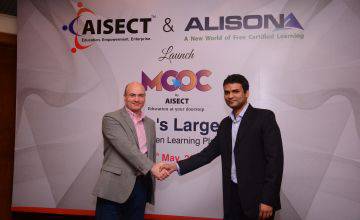
Change is the key word to moving ahead, and change in the mindset may be all that is needed to make a better world. Hence, change not only in the system, but also in the “traditional mindset” could turn around things and bring about the much needed dynamic change in the Indian education system.
“Students as well as parents want to get only traditional degrees. They do not focus on learning but only that they get a degree,” Abhishek Pandit, director-business services of e-learning platform AISECT, said to thestatesman.com, with regard to the Indian education system. The biggest challenge, he said, was to work with people’s mindset towards change in education in India.
Echoing the same views and emphasizing the need to change the conventional attitudes, ALISON founder Mike Feerick said, “It is the traditional mindset surrounding education in India which needs to change.”
Among the other challenges were accessibility and infrastructure. “Accessibility to education here is difficult. It is common knowledge that the gross enrollment ratio in educational institutions in India is very less,” Pandit said.
“What about the children who finish school? They don’t get free education. That is what we have tried to tackle,” he said.
“We faced infrastructural challenges as well. Roads, buildings, internet, etc. are problems that cannot be solved within two or three years,” he added.
Sharing the same concern and goals regarding education in India, ALISON has partnered with Bhopal-based AISECT to bring about a comprehensive online platform ‘aisectmoocs.com’ to boost skill-oriented educational training in India. The formal launch of the coming together of the two platforms was held in Delhi.
According to Feerick, the company wants to bring global expertise to India. “We wish to bring the world to India, and India to the world,” he said. He said that the company is not a venture capital platform but rather, it helps learners gain entrepreneurial skills and helps them connect with banks, which in turn provide the capital.
Pandit also said that different students have different needs. Not all students are the same. Keeping this in mind, AISECT has established various centers across the country where learners can consult instructors and engage in peer-to-peer interaction.
While ALISON is an Ireland-based e-learning open platform where people across ages and skill levels can avail of free learning services, AISECT is an Indian open learning organization. One of the major partners of the National Skill Development Corporation (NSDC), 30-year-old AISECT looks at mainly tier two and tier three-level education.
Meanwhile, ALISON has been working with respective local partners around the world to maximize learning abilities. “In the US, we work with the State Department; in the Middle East, we work with the Qatar government and Microsoft. In India, AISECT was the largest online learning platform, so we tied up with them as they shared our vision,” Freerick said.
Instead of theoretical education based solely on the passing of exams and getting the stamp of an educational institute on your resume, AISECT focuses on imparting entrepreneurial as well as practical knowledge. “We focus on entrepreneur skills and unorganized placements. Last year, we gave the NSDC 71 per cent placements,” Pandit said.
The two organizations want the students to become entrepreneurs because that puts their future in their own hands.
With an e-learning platform such as this, traditional universities need not be the sole custodians of education anymore. This type of learning is more skill based, and you can test your skills online as and when you learn them. By making the platform free of charge, the two e-learning platforms have made a collective effort to make education free for all users, not just for the selected few who can afford colleges and universities.
Currently, the platform offers courses mostly through the English medium and a few in Hindi. However, within the next two years, they plan on introducing courses in Bengali, Oriya and two South Indian languages as well. Aisectmoocs.com has kept ease-of-access as one of its priorities while developing the platform. “Mobile penetration has been incredible in India. By 2020, a majority of the India population will have mobile phones,” said Freerick, which makes the courses available within easy reach.
Source: The Statesman

Leave a Reply